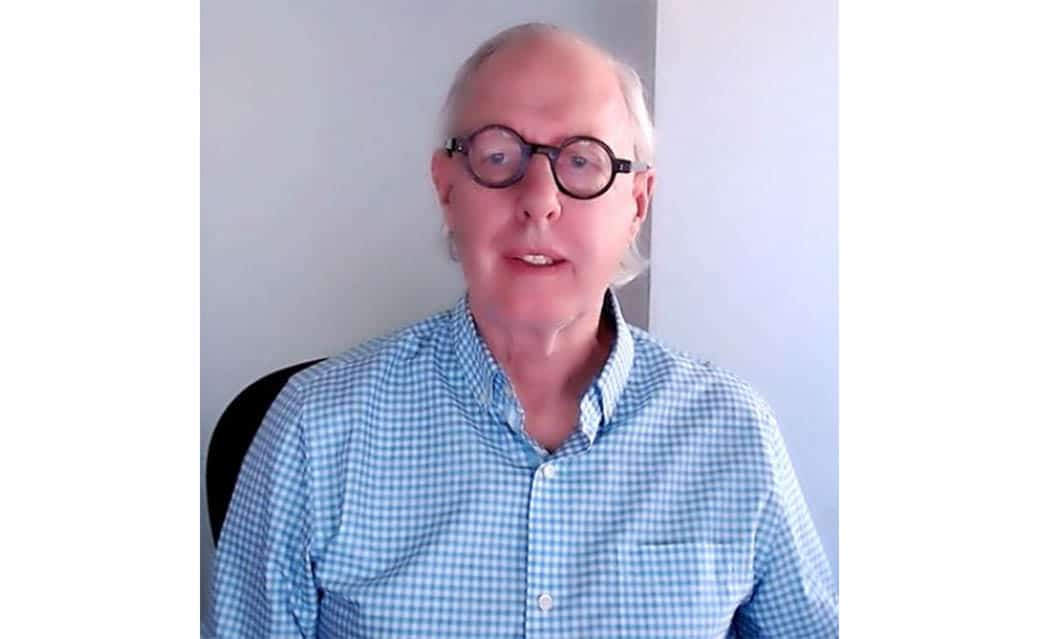Faculty Feature | “Never say no to yourself, let others say no”: The legend of Professor Guy Allen
From a U.S. fugitive to the founder of UTM’s Professional Writing and Communications program, Professor Allen brings a fresh perspective to teaching.
I will never forget the first time I walked into Professor Guy Allen’s office. Illegible writings on loose papers. Books stacked on books along the little round table. The dim yellow light from the corner of the office. A hippie green beanie and his signature black-rimmed glasses.
Professor Allen didn’t get his own office until 1998, when he became the director of the Professional Writing and Communications (PWC) program. Before that, he started his journey in academia as an English and Economics undergraduate student. He never excelled in his studies, but slowly figured it out and decided to pursue his master’s at the University of Chicago.
“I didn’t want to join and serve for the Vietnam War. And it was mandatory at the time,” recalls Professor Allen. He sighs every time he touches upon this subject. “I had to leave for Toronto at 7 a.m. because they were out to get me at 9 a.m.”
Professor Allen first encountered the University of Toronto when they came to an agreement with the University of Chicago for him to complete his master’s at U of T.
He then went on to complete his PhD, specializing in Anglo-Saxon and Old Middle English.
“I started to love teaching when I became a part-time instructor teaching college-level courses. There were a lot of kids with limited access to the tools of success we have,” says Professor Allen. “To watch them grow and know that I’m making a difference for them was the reason I fell in love with teaching.”
In 1975, Professor Allen began to teach Effective Writing, an early predecessor of the PWC course WRI203: Expressive Writing. WRI203 was the only requirement for students to get into the PWC program, but that changed when the program was integrated with the Communication, Culture, Information and Technology general program requirements in the Fall of 2020—news that wasn’t well received by most members of the PWC community.
“They should’ve renamed the course to ‘ineffective writing,’” states Professor Allen. “It was hard to see the creativity the students have. Their voices were oppressed by all the rules the course had. No one knew what a hamburger structure was, or what topic sentences were. It felt mechanical.” A hamburger structure is the most common paragraph structure that writers use. Following the structure, an introductory sentence acts as the top bun, details and explanations as the toppings, and a conclusion as the bottom bun. It is one of the widely known tools PWC students have in their toolbox, along with topic sentences.
The ‘80s marked the new wave in pop culture and, in many ways, changed what classrooms and education looked like. For Professor Allen, this change came in the form of two students who decided to hand in personal narratives for their final assignments. One of these narratives was about the student getting fired from a bakery due to an incident that wasn’t their fault, while the other was about a little league baseball team planning a heist to steal the doorbell of a corner store.
“I showed these stories to the class and everyone loved it,” recalls Professor Allen as he stands up and walks towards the bookshelf behind me. His towering figure reaches for a sky-blue book. “I realised that when students like something and relate to it, they will try to imitate it. And that is why I [put together] the first compilation of student work in 1989 called No More Masterpieces.” Professor Allen hands me the book. Funky red art pops out from the yellowing of the cover. He places it back on the shelf carefully, a cheeky smile scrawling across his face. “That’s also why all our textbooks are collections of stories from other students.”
In 1998, Professor Allen was on his way to Vancouver for a conference. On the way there, he met UTM’s Dean, who coincidentally was on a business trip to attend Professor Allen’s conference. After the conference, the Dean told him how much he enjoyed it and offered him his own program and a director’s position.
Prior to becoming the director of PWC, Professor Allen started his own publishing company, called Life Rattle Press, in 1995. He first published small, creative non-fiction books. In 2000, Life Rattle Press staged the well-known The Totally Unknown Writers Festival, a writer’s festival that continues today. Life Rattle Press is the go-to publisher for students in the WRI420: Making a Book course.
“I wanted to open the world of writing with Life Rattle Press. Writing a book or writing in general isn’t just for the elites. It’s for good writers from any background. And I want to provide the tools for them to start,” expresses Professor Allen. “Even with [WRI307:] Writing about Science, I want students to know that science writing is fun and challenging. We need that in the world right now: a way to express information without restraints.”
Professor Allen believes that writing is not reserved for the talented. He treats his students as writers but also emphasizes the need to read and learn from prose. The abundance of reading assignments in a PWC course reflects his mentality. The quality of work produced at the end of each student’s year shows the success of his advice.
“As faculty members, it’s important for us to foster an environment where writing becomes a positive experience. Too many times have we heard of students fearing writing because of hurtful criticism or discouragement. We have to be thoughtful about this,” sighs Professor Allen. “Having that system of support within the students really makes a difference. Once again, there’s a limit to what one person can teach.”
Professor Allen’s ideals and teaching philosophies are a refreshing breeze in a classroom, now echoed by the then-students-now-professors in the PWC program. Even after stepping down as the director of the PWC program, he continues to teach WRI307: Writing about Science, WRI360: Finance and Writing, and WRI420: Making a Book.
“I love all the courses I teach. And I love seeing the community of writers these classes create,” he says. When reflecting on the advice he would give to prospective writers, he expresses to “never say no to yourself. Let others say no to you.”
Features Editor (Volume 50) — Louis graduated from UTM with a Bachelor of Science double majoring in Psychology and Professional Writing and Communication. He is currently in the field of UX/UI design, conducting research on how to improve user experience in apps and websites, designing websites for companies that are looking to branch online. As the Features Editor for Volume 50, Louis wants to bring the experience of reading enjoyable and informative for everyone. He hopes to showcase student voices and empower them through editing. When Louis is not at his computer designing websites or writing, he is opening Pokémon card packs chasing the Charizard or at the gym training his mind and body.


